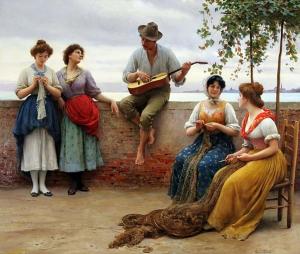Leonora D'Orco: A Historical Romance
Nonfiction, Religion & Spirituality, New Age, History, Fiction & Literature| Author: | George Payne Rainsford James | ISBN: | 9781465607294 |
| Publisher: | Library of Alexandria | Publication: | March 8, 2015 |
| Imprint: | Language: | English |
| Author: | George Payne Rainsford James |
| ISBN: | 9781465607294 |
| Publisher: | Library of Alexandria |
| Publication: | March 8, 2015 |
| Imprint: | |
| Language: | English |
There is a mountain pass, not far from the shores of the Lago Maggiore, which has been famous of late years for anything but fêtes and festivals. There, many an unfortunate traveller has been relieved of the burden of worldly wealth, and sometimes of all earthly cares; and there, many a postillion has quietly received, behind an oak-tree or a chesnut, a due share of the day's earnings from a body of those Italian gentlemen whose life is generally spent in working upon the highways, either with a long gun in their hands or a chain round their middles. But, dear reader, the times I speak of were centuries ago--those named "the good old times," though Heaven only knows why they were called "good." The world was in a very strange state just then. The resurrection of art--the recovery of letters--the new birth of science, marked out the age as one of extraordinary development; but the state of society from which all these bright things sprang--flowers rising from a dunghill--was one of foul and filthy fermentation, where every wickedness that the corrupt heart of man can devise worked and travailed for the birth of better things. That pass, in those "good old times," saw every day as much high-handed wrong and ruthless bloodshed as any pass in all Italy at the present time. But such was not destined to be the case upon the present occasion, though the times of which I write were the end of the fifteenth and the beginning of the sixteenth centuries. Guilt, and fraud, and even murder, often in those days covered themselves with golden embroidery and perfumed flowers; and, interposed between acts of violence, rapine, and destruction, were brilliant festivals, the luxurious banquet, and the merry dance. Wickedness, like virtue, proposes to itself enjoyment for its object; and the Bible is right when, as it often does, it uses the word wisdom as synonymous with virtue, for in the wisdom of the means is the certainty of the attainment. But the men of those days, as if they felt--how could they avoid feeling?--the insecurity of the ground on which they based their endeavours for the acquisition of happiness, were content to take the distant and doubtful payment by instalments of fruition, and let the revel, the pageant, the debauch go to the great reckoning as so much gained, without thinking of the terrible per contra.
There is a mountain pass, not far from the shores of the Lago Maggiore, which has been famous of late years for anything but fêtes and festivals. There, many an unfortunate traveller has been relieved of the burden of worldly wealth, and sometimes of all earthly cares; and there, many a postillion has quietly received, behind an oak-tree or a chesnut, a due share of the day's earnings from a body of those Italian gentlemen whose life is generally spent in working upon the highways, either with a long gun in their hands or a chain round their middles. But, dear reader, the times I speak of were centuries ago--those named "the good old times," though Heaven only knows why they were called "good." The world was in a very strange state just then. The resurrection of art--the recovery of letters--the new birth of science, marked out the age as one of extraordinary development; but the state of society from which all these bright things sprang--flowers rising from a dunghill--was one of foul and filthy fermentation, where every wickedness that the corrupt heart of man can devise worked and travailed for the birth of better things. That pass, in those "good old times," saw every day as much high-handed wrong and ruthless bloodshed as any pass in all Italy at the present time. But such was not destined to be the case upon the present occasion, though the times of which I write were the end of the fifteenth and the beginning of the sixteenth centuries. Guilt, and fraud, and even murder, often in those days covered themselves with golden embroidery and perfumed flowers; and, interposed between acts of violence, rapine, and destruction, were brilliant festivals, the luxurious banquet, and the merry dance. Wickedness, like virtue, proposes to itself enjoyment for its object; and the Bible is right when, as it often does, it uses the word wisdom as synonymous with virtue, for in the wisdom of the means is the certainty of the attainment. But the men of those days, as if they felt--how could they avoid feeling?--the insecurity of the ground on which they based their endeavours for the acquisition of happiness, were content to take the distant and doubtful payment by instalments of fruition, and let the revel, the pageant, the debauch go to the great reckoning as so much gained, without thinking of the terrible per contra.















